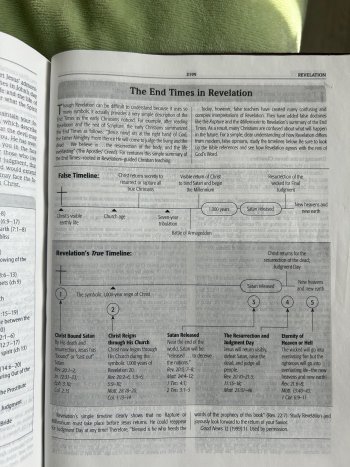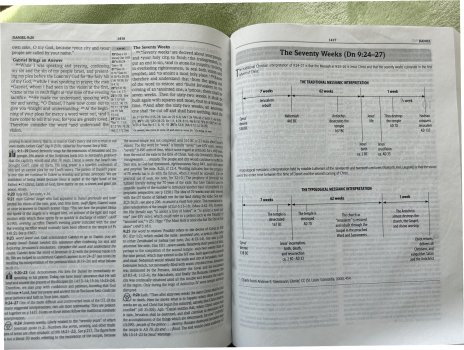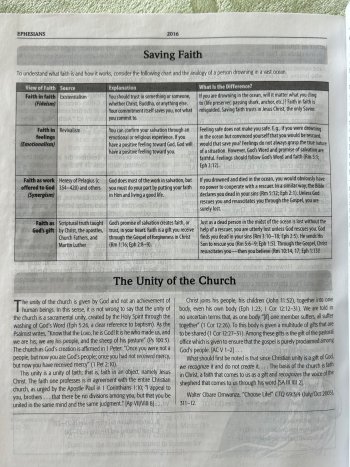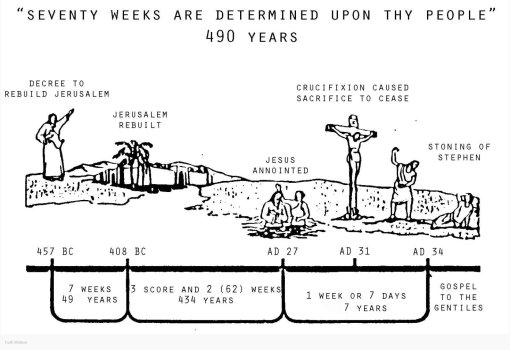Would you post these 2 verses from that particular version, so that we can check it for accuracy and Truth?
John 4:24
1 Timothy 3:16
Yesterday I wrote: "I do not use the ESV translation myself, as my 'study Bible', but it is the study aids that I find so helpful in that LCMS Study Bible. If you look at the links I gave, notice the helps, and even the short commentaries you'll find are conservative. I also agree that God has blessed the KJV for over 400 years as THE English Bible translation and it is my basic study Bible because my Bible reference sources use the Strong's numbering system, which is based on the KJV."
So, my primary or basic Study Bible is the KJV and my carry to church Bible is a Cambridge KJV with the OT,
Apocrypha and NT. I learned something just this morning reading in that Cambridge KJV. I was starting in 1 Macc. and came across this in verse 15 -
1Ma 1:15 KJVA "And made themselves uncircumcised, and forsook the holy covenant, and joined themselves to the heathen, and were sold to do mischief."
The cross reference in the margin was to 1 Cor. 7:18 and it reads -
"Is any man called being circumcised? let him not become uncircumcised. Is any called in uncircumcision? let him not be circumcised." (1Cor 7:18 KJV)
I had always thought of that as figurative language until reading the background in 1 Macc.
The old Puritan John Trapp in his 17th century commentary on 1 Cor. 7:18 wrote:
"Ver. 18.
Let him not become uncircumcised] Some Jews, for fear of Antiochus, made themselves uncircumcised, RAPC 1 Maccabees 1:15. Others for shame after they were gained to the knowledge of Christ, as here. This was done by drawing up the foreskin with a sergeon’s instrument. And of this wicked invention Esau is said to be the first author and practiser. (Godw. Antiq. Hebr.)"
WOW! Not only does my KJV have the apocrypha, it cross referenced to the NT. Then I find the Puritans were using the Apocrypha and mention it in their commentaries. John Gill mentions this also.
But, the two verses you asked about as the ESV translates, are John 4:24 and 1 Tim. 3:16 -
"God is spirit, and those who worship him must worship in spirit and truth.” (John 4:24 ESV2011)
"God
is a Spirit: and they that worship him must worship him in spirit and in truth." (John 4:24 KJV)
*The KJV puts "is" in italics to how it was added by translators, it is not in the Greek
The Net2.1 Bible explaining "spirit" rather than "Spirit" reads,
"tn Here πνεῦμα (pneuma) is understood as a qualitative predicate nominative while the articular θεός (theos) is the subject."
"Great indeed, we confess, is the mystery of godliness: He was manifested in the flesh, vindicated by the Spirit, seen by angels, proclaimed among the nations, believed on in the world, taken up in glory." (1Tim 3:16 ESV2011) * Margin on "He" (Greek Who; some manuscripts God; others Which)
"And without controversy great is the mystery of godliness: God was manifest in the flesh, justified in the Spirit, seen of angels, preached unto the Gentiles, believed on in the world, received up into glory." (1Tim 3:16 KJV)
1 Timothy 3:16:
TEXT: "He was made apparent in the flesh"
EVIDENCE: S* A* C* G 33 syr(pal) syr(p,h)? cop?
TRANSLATIONS: ASV RSV NASV NIV NEB TEV
RANK: B
NOTES: "God was made apparent in the flesh"
EVIDENCE: Se A2 C2 Dc K L P Psi 81 104 614 630 1241 1739 1881 2495 Byz Lect
TRANSLATIONS: KJV ASVn RSVn NASVn NIVn
NOTES: "Which was made apparent in the flesh"
EVIDENCE: D* lat vg syr(p,h)? cop?
TRANSLATIONS: ASVn RSVn
COMMENTS: The word "who" was changed to "which" by some copyists to refer to "mystery." In an older manuscript that does not have accents and breathing marks, all that is required to change the Greek word for "who" (OS) to the abbreviation for "God" (OS) is to add two marks. This happened to several manuscripts, apparently to give a definite subject to the following verbs.

 www.christianbook.com
www.christianbook.com






